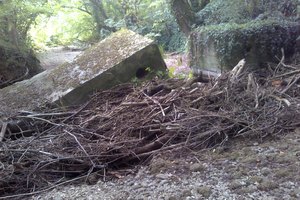New study into fish passage on Dorset chalk stream
Press release
The Environment Agency is to fund a new study to improve fish passage on the River Tarrant in Dorset.

One of the obtacles hindering fish passage on the River Tarrant
The Tarrant – a chalk stream to the east of Blandford Forum – is one of England’s most productive brown trout locations. It is the main spawning ground for salmon and trout in the middle reaches of the main River Stour.
Like many chalk streams, the Tarrant is ground fed and is a ‘winterbourne’ – it naturally dries up in summer. Unnaturally, because of man-made in-stream structures such as weirs, the Tarrant dries up from the bottom – leaving fish stranded behind the structures.
Most years, the Environment Agency rescues hundreds of stranded fish and moves them to the Stour.
Now, the Environment Agency is to fund a new detailed study to address the issues on the Tarrant. The study, to be conducted by Wessex Rivers Trust, will include a desktop study of historic maps, hydrological data, LIDaR data, and underlying geology. Fieldwork will include a topographic survey of the 7 sites associated with fish entrapment, drawn up as long sections, cross sections and plan views.
There will be a round of stakeholder engagement and people will be able to view outline designs for each site. The findings and designs will be promoted in spring next year.
Luke Kozak, Environment Agency Project Manager, said:
This project will focus on the lower stretch of the River Tarrant. Here it dries out frequently in summer, leading to significant numbers of fish and invertebrates becoming trapped in pools as the river recedes.
We have been carrying out fish rescues for the past 20+ years to prevent the death of significant numbers of fish. Our data suggests that in 2003 some 2,800 salmonids were rescued from different areas of the River Tarrant and moved downstream to the main River Stour.
The river is not only an important spawning tributary for salmonids, but also contains bullhead (Cottus gobio), a protected species under Annex II of the European Habitats Directive.
Background
- A network of restoration projects, new funding and updated definitions for chalk streams have all been outlined in a new plan published today (25 November) by Catchment Based Approach (CaBA). Find out more here: LINK TO NATIONAL CHALK STREAM RELEASE ON GOV UK
- £20,000 funding for the Tarrant study comes from the Water Environment Improvement Fund (WEIF).
- LIDaR is an airborne mapping technique which accurately measures the height of the terrain and surface objects on the ground, through the use of a scanning laser that measures the distance between the aircraft and the ground.
- More than 40 chalk streams are found in Dorset and Hampshire, covering the Hampshire Avon and parts of the Dorset Stour and Poole Harbour catchments.
Published 25 November 2022
